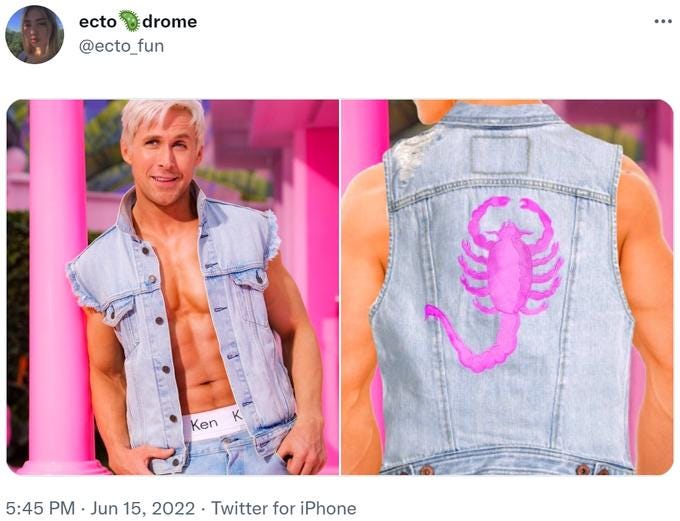Put that Manly Hand in Mine
my final thought on Barbie
I feel sheepish to write about the Barbie movie because I have a lot to say about Ryan Gosling, so I’m gonna just get it all out of my system.
I was always interested in Ryan Gosling, and as a teen, I went out of my way to watch movies that he was in. Ryan Gosling is kinda like the male Zooey Deschanel - the movies he was in were always interesting and quirkier than I was expecting. He did blonde bi-coded bad boy in The Place Beyond the Pines, he did kind-hearted, troubled weirdo in Lars and the Real Girl. He does The Notebook. I really liked him in First Man. Before I could really articulate it, I related to him.
But like many young, masculine-of-center teens these days, I spent my high school years trying to figure out how to “be a man” by listening to film-bro podcasts, and that means that I got really, really attached to the movie Drive.
As a matter of fact, after I saw Drive I started wearing this purple, satin jacket with an embroidered eagle on the back of it to school, even though it was a little too small and uncomfortable to wear, because it made me feel like I was Ryan Gosling in Drive. There were four minutes between classes, which was just enough for me to put in my headphones, start listening to “Nightcall,” strut from one classroom to the other, take my headphones out, and get all my notebooks and pens and stuff laid out before classes started. Ryan Gosling was always doing a masculinity that was closer to me and felt accessible to me. So I was really, really, really looking forward to Barbie.
From the trailers, the promotional materials, and the utter joie de vivre that playing this role brought out of Ryan Gosling, I thought that Barbie was going to be the evolution of this little bit of gender expansiveness that Ryan has signaled to me since I was a teenager. I thought that he was gonna be this fruity, hunky boi who really enjoys being a supportive and goofy person in Barbie’s life. I went in with a lot of expectations.
So like, yeah, imagine my horror that the whole movie is actually about how, like, Ken’s fragile masculinity causes people a lot of harm and when he hears that there’s a patriarchy he didn’t have the faculties to do an analysis that would have lead him to understand that this structure is bad for everyone?
Admittedly, the use of Ken’s fragile masculinity as a plot device in Barbie triggered my own gender fragilities. I did need to take a couple of days to talk out some of my more butthurt feelings and get over myself, and my expectations, to engage with the movie as it exists. The gender politics of Barbie were really, really muddy. The super power of the Barbie movie is literally ontology: If you listen to what your mom (America Ferrara) has to say about the trials and tribulations that go into being a woman, it unbrainwashes you and brings you back into Barbieland, intellectually. Once all the Barbies are unbrainwashed, they decide that the best way to move forward politically is to pit the Ken’s against each other. I know a handful of cis women who thought that this was a really awesome turn - it seems to have been cathartic in the way that it represented the ways that women and men engage with each other in our world as it is now. But this moment fell really flat for me. Why didn’t they just indoctrinate the Kens into feminism too?
The fact that, at the end of the movie, the leadership of Barbieland explicitly enforces gender-based oppression in their government structure is a confusing choice for me. Throughout the whole movie, the only options for masculinities is to be a Ken, who is stinky and obnoxious and gross, and whose favorite song is a chillingly revelatory “Push,” by Matchbox 20; or to be an Allan, who - even though he is incredibly politically supportive of the Barbies the entire time they’re trying to win back their nation and government - is treated like a weird loser by the Barbies during the film’s wrap up exposition montage. Don’t even get me started on “Weird Barbie.” Instead of the movie ending with a liberatory, and imaginative, equality in Barbieland, they lean into the idea that in society, one identity group is always going to end up being dominant. In a movie that goes out of its way to lean into the magic in its premise, this decision to lean into a perceived political “reality,” was a message that I wasn’t able to ignore.
Barbie is a lot more about the world that we live in than the world that we could live in. I was hoping that it would be a little bit more utopian, but I can see why Greta Gerwig would make the choices she made - or I could see how Mattel would have a vested interest in encouraging more of a tit-for-tat gender liberation story instead of presenting something more expansive and genuinely inclusive. From the hype, and from my own history of taking cues from Ryan Gosling about how to manage having a gender, I was really hoping to come out of it with more of an idea of how we can all live together. That’s my own baggage.

